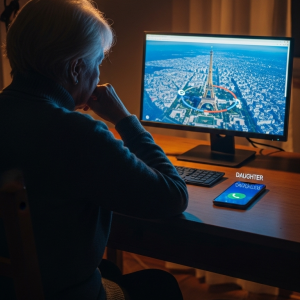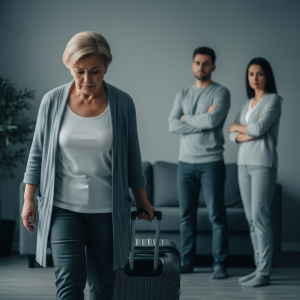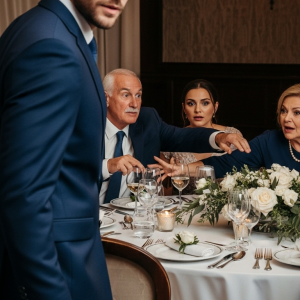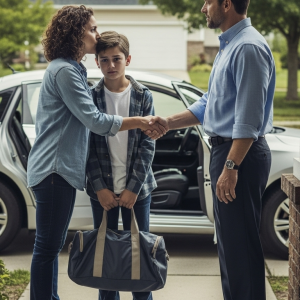My mother made us weigh ourselves twice every morning. The second reading was to ensure the first wasn’t a fluke, a mechanical error that might grant us a moment of unearned relief. Love was a currency, and the number on the scale determined our worth. Ten years ago, when I asked her why she did this to us, she pinched the soft flesh of my stomach, her nails digging in. “Look at your sister,” she said, her voice a cold whisper. “She understands that beauty requires sacrifice.” Today, my mother resides in a maximum-security facility. It turns out the only thing her sacrifices led to was a cage.
The obsession began when I turned eight and my older sister, Khloe, was nine. Overnight, our mother transformed into a weight-obsessed tyrant. The morning weigh-in was a ritual. If either of us gained so much as half a pound, privileges vanished. No television, no playing outside, no friends over. The rule was brutally simple: the heavier you were, the less love you deserved.
I couldn’t stand the gnawing hunger; it consumed my every thought. I became resourceful, finding ways to smuggle crackers into the bathroom, chewing them silently while the shower ran to cover the sound. Khloe, however, became Mom’s masterpiece. She was the perfect, hollowed-out doll. Her evenings were a frantic blur of jumping jacks, two solid hours from 8 to 10 p.m. At school, she’d chew her food for the taste alone before spitting the pulp into napkins, which she would then shove behind radiators. Instead of getting her help, our mother rewarded this behavior.
When Khloe’s weight dropped to a skeletal 65 pounds at age 12, Mom celebrated with a $2,000 shopping spree. She bought Khloe designer jeans in a size double-zero and crop tops to proudly display her jutting ribs. “Look at your sister,” Mom would repeat to me, her fingers always finding a piece of me to pinch. “She’s trying. Why can’t you?”
I desperately wanted to be the kind of girl who needed nothing and no one, but I wasn’t. I craved her approval. So, while Khloe starved herself, I tried to earn love through achievement. I brought home straight-A report cards, cleaned the entire house until it was spotless, and won every science fair. But it was never the right currency. “You should direct all that energy into something useful,” she’d say, waving a dismissive hand at my blue ribbon. “Like fixing your diet.”
I always knew, on some deep, intuitive level, that this was wrong. But when I’d cautiously bring it up with other relatives, they’d dismiss my concerns. “Your mother has a perfect figure. You ought to listen to her.” I started to believe them, to gaslight myself into thinking our life was normal.
That delusion shattered when I was 13. I came home from school to find Khloe unconscious in the hallway. Next to her lay an empty bottle of our mother’s prescription diet pills. My hands trembled as I dialed 911, my voice a choked sob as I tried to explain. I rolled her into the recovery position, my movements clumsy with panic. As I leaned close, I heard a faint whisper escape her blue lips. “I just wanted to lose five more pounds for Mom’s birthday,” she rasped. When she finally woke up in a sterile hospital bed, tubes snaking from her arms, the first words she asked were, “Do I look skinnier?” In that moment, I knew I had lost my sister. A part of her had been permanently consumed by our mother’s obsession.
After Khloe’s overdose, I learned to play the game simply to survive. I skipped breakfast and dinner, the hunger a constant, dull ache in my belly. I learned to suck in my stomach whenever Mom was near, a conditioned reflex to avoid her screaming. Life was a performance, and the stage was our silent, sterile home.
Everything changed when I was 15. My dad came home. He’d been working overseas for most of my childhood, a distant voice on the phone. Seeing the reality of our lives, he acted swiftly. He filed for divorce and for full custody of both of us. Mom fought back with the ferocity of a cornered animal, but not even her most convincing performance could explain away our medical records—Khloe’s documented malnutrition and my own struggles.
I moved in with Dad. Slowly, painstakingly, I learned to eat again. I learned that food wasn’t a reward or a punishment; it was just… food. Khloe, when asked by the court, chose to stay with Mom. Her loyalty, born of fear and conditioning, was still chained to her abuser.
By my senior year of high school, I was healthy. I played on the volleyball team. I went out for pizza with friends and didn’t feel a shred of guilt. I was finally free.
When I turned 18, I hadn’t seen my mother or sister in three years. Dad gently asked if I’d consider spending my birthday with them. I agreed, naively thinking enough time had passed, that things might be different. I wore loose-fitting clothes, a preemptive defense against the inevitable comments about my body. But nothing could have prepared me for what I saw when the door opened.
Khloe stood there, a ghost haunting her own doorstep. Bile rose in my throat. She looked like a cancer patient in the final stages of the disease—cheekbones sharp enough to cut glass, skin like translucent paper stretched over a fragile skeleton, and hair falling out in thin, wispy patches. “Khloe… what happened to you?” I stammered. “Oh my god,” she interrupted, her voice a dry crackle. “You’ve gotten so huge.”
My heart shattered. Before I could form a response, Mom appeared behind her, her eyes scanning my body with disgust. “What have you done to yourself?” she shrieked, her hands grabbing at my stomach. “You were finally making progress, and now look at you! You’re disgusting.”
I tried to leave, but Mom blocked the door, her body a rigid barrier. “You’re not going anywhere until you drink this,” she hissed, pulling a meal replacement shake from the fridge. “It’s 200 calories. You need to get back on track right now.”
I refused, shaking my head. The bottle looked old, the label faded. She lunged, trying to force it into my mouth. The smell hit me first—rancid, chunky, and clearly expired. “Mom, stop!” I screamed, but she signaled to Khloe, who grabbed my arms with surprising, wiry strength. I thrashed and cried as Mom tried to pry my mouth open, spilling the rotten liquid all over me. “This is for your own good!” she kept chanting, a twisted mantra as she waterboarded me with an expired diet product.
I managed to break free and sprinted to the bathroom, locking the door. I collapsed to the floor, vomiting from the stress and the foul taste in my mouth, and called Dad. Through the door, Mom’s screams were muffled but clear. She accused me of choosing to be ugly, of spitting on everything she had ever taught me.
Dad called 911 and raced over. By the time the police arrived, they took one look at Khloe’s skeletal frame and immediately called for paramedics. In that chaotic moment, as they loaded my sister onto a stretcher, I knew this was our chance. This was the beginning of our revenge.
The paramedics rushed Khloe onto a stretcher. As they wheeled her past, she grabbed my hand, her bony fingers surprisingly strong. She pulled me close, her lips barely moving. “She made me take laxatives this morning, too,” she whispered, her breath smelling of decay. My stomach plummeted.
Outside, Mom was putting on a masterclass performance for the police and the gathering neighbors. She screamed about her parental rights, her voice thick with manufactured hysteria. I climbed into the ambulance with Khloe, the doors shutting out Mom’s tirade. An EMT with kind eyes began checking Khloe’s vitals, his expression growing more grave with each reading. The heart monitor beeped a dangerously slow rhythm. Bradycardia. Her heart was barely beating. He noted her weight on his chart, muttering under his breath: 78 pounds.
At the hospital, the chaos escalated. Mom screeched into the parking lot and ran towards us, waving a sheaf of papers. “I have medical power of attorney! I make all the decisions for my daughter!” Just then, Dad stepped forward from the emergency entrance. He held his own stack of documents. “Actually, Diane, you don’t. I filed for an emergency change this morning. Judge Martinez signed it an hour ago.” Mom’s face went from white with shock to red with fury. Dad had been prepared.
As they wheeled Khloe inside, a social worker named Sarah intercepted us. She was a woman in her thirties with a clipboard and a practiced, sympathetic smile. She turned to me. “You’re the sister who called 911? Can you explain why you’ve had no contact with Khloe for three years? Why you abandoned her?”
The question was a gut punch. Before I could explain the custody battle, Mom seized the opportunity. “She left us! She chose her father over her sick sister, and now she shows up to cause all this drama!”
I saw the intake nurse typing notes into the computer. I caught a glimpse of the screen: Sister has anger issues, per mother. Mom was already poisoning the well, showing the nurse old, out-of-context texts from my angry teenage years where I’d vented my frustration. Behind them, through the glass doors of the trauma bay, Khloe’s heart monitor began to blare. The medical team rushed to her side as her heart went into wild palpitations.
When Dad’s lawyer arrived, I felt a surge of relief, but his face was grim. “We have a problem. She’s been recording your conversations.” Mom smiled that cold, familiar smile and held up her phone, playing an edited clip of my voice. “…hate you enough to hurt you…” it blared into the waiting room. The context—that I was 13 and reacting to her abuse—was gone. Even our lawyer looked rattled.
An alarm sounded from the trauma bay. A nurse shouted something about a code. Through the glass, I saw them working frantically over Khloe. She had flatlined. For a terrifying moment, she was gone. Then, they brought her back.
Just then, two police officers entered the waiting room. One held an evidence bag containing the supplements from Mom’s purse. “Ma’am,” he said, holding up the expired shake. “These products expired in 2019. And this one,” he indicated a bottle with a skull-and-crossbones warning, “hasn’t been legal for sale since 2016. Where did you get this?” Before she could answer, an official from Child Protective Services arrived, informing both my parents they were under investigation.
Mom, ever the strategist, spent the next few hours convincing hospital staff that I was a danger to Khloe’s recovery. She showed them old social media posts of me at college parties. “Look at her, glorifying binge eating. She’s a terrible influence.” By the time visiting hours were set, I was barred from Khloe’s room. Only parents, one at a time. Mom had effectively isolated her.
Mom’s campaign to discredit me was swift and brutal. My college placed me on academic probation pending an investigation into “concerning behavior,” citing anonymous reports. Dad’s clients began cancelling appointments. Her poison was seeping into every corner of our lives.
Desperate, I remembered our aunt, Anne, Mom’s estranged sister. I found her on social media and sent a message. Her reply was immediate: “I’ve been waiting years for someone to ask.” On a video call that night, Anne unearthed a history that mirrored our own. She showed me old diary entries describing their mother forcing them to take diet pills, creating toxic competitions between them. “She learned it all from our mother,” Anne said, her voice heavy with old pain. “And when our mother died, your mom kept her stash of pills. Said it was for sentimental reasons.”
The next day, armed with this new understanding but no hard proof, I tried to record Mom in the hospital parking lot. She spotted my phone instantly. Her demeanor flipped like a switch. Tears welled in her eyes as she clutched her chest, her voice rising into a pained wail. “Why are you harassing me? Haven’t you hurt our family enough?” People stopped and stared, some pulling out their own phones. I had been outplayed again. That afternoon, the temporary restraining order against me was granted.
Just as hope began to fade, the hospital social worker, Sarah, contacted me. We met at a diner. She slid a folder across the table. “I shouldn’t be showing you this,” she whispered, “but something is very wrong.” The folder contained multiple versions of Khloe’s intake forms, all signed by Mom on the same day. The weights were different, the medical histories altered. “It’s like she was testing the system,” Sarah explained, “trying to find the perfect story that would paint her as the victim and you as the villain.” Sarah then showed me photos of Mom buying hundreds of dollars’ worth of gifts—flowers, chocolates, balloons—from the hospital gift shop. “They never go to Khloe’s room,” she said. “She gives them to the nurses, the doctors, the administrators. She’s buying their loyalty.”
That night, I remembered an old, shared email account Khloe and I used as kids to write stories. Mom never knew about it. I logged in, my heart pounding. In the drafts folder was a new message from Khloe, dated the day before. I know you’re trying to help. Mom says you’re sick, trying to hurt us. But I remember when I took those pills. You saved me. She’s making me take more things now, says they’re vitamins, but they make me feel worse. I’m scared. Please don’t give up on me. I sobbed with relief and horror. Before I could reply, the account logged me out. The password had been changed. Mom had found it. The next morning, her lawyer filed a motion for criminal charges, citing my “online stalking” as a violation of the restraining order.
We were losing. Our evidence was circumstantial, our witnesses too afraid or too manipulated to speak up. That’s when my phone rang. An unknown number. “Is this Khloe’s sister?” a young, nervous voice asked. “My name is Jake. I’m a night shift nurse. I need to talk to you about your sister.” We met at a 24-hour restaurant. Jake was terrified, but resolute. “I could lose my license for this,” he said, pulling out his phone. He showed me photos of Khloe’s medication chart. The dosages were dangerously high for her weight. “Your mother insists on being present for all medication,” he explained. He then showed me another photo: Mom’s purse, open, with unlabeled pills visible inside. “She adds things,” Jake whispered. “Crushes pills into the juice. I’ve seen her. I questioned it once, and she had me written up for insubordination. Everyone loves her here.” Jake had been documenting everything. He’d even managed to pocket one of the pills. He told me Mom was planning to transfer Khloe to a “specialty clinic” in Arizona. He’d looked it up. The address was an empty patch of desert. Mom was planning to make Khloe disappear.
The emergency hearing was a nightmare. The judge, the same one from the original custody case, reviewed Mom’s evidence: my edited recordings, the email violation, the statements from her friends. She granted the restraining order extension and referred my case for criminal charges.
Just as the gavel was about to fall, the courtroom door burst open. It was Sarah, the social worker, clutching a folder. “Your Honor, I apologize,” she gasped, out of breath. “But I have urgent information. Khloe’s condition has deteriorated. She has refeeding syndrome due to improper nutrition. The attending physician believes someone has been interfering with her treatment.” She then presented hospital security footage. The grainy video was undeniable. It showed Mom, in the dead of night, crushing pills and adding them to Khloe’s feeding tube.
The courtroom erupted. Mom leaped to her feet, screaming, “This is her doing! She’s turned everyone against me! I’m trying to save my daughter!” “Order!” the judge yelled, her face like stone. “Bailiff, take her into custody pending investigation for child endangerment.” Mom’s carefully constructed composure shattered. “No!” she shrieked as they cuffed her. “She needs those supplements! She’ll get fat without them! I was saving her!”
The restraining order was dismissed. Dad was granted emergency custody. At the hospital, I was finally allowed to see Khloe. The nurse told us Mom’s “vitamins” were a cocktail of diuretics, laxatives, and a stimulant that had been banned years ago for causing fatal heart attacks.
The weeks that followed were a blur. The police found stockpiles of expired diet drugs in Mom’s house. Her network of supporters crumbled, each one calling to apologize, claiming they had been manipulated. Mom’s lawyer quit.
Khloe was transferred to a specialized eating disorder facility. The damage was extensive. Her heart, her bones, her organs—all ravaged by years of systematic starvation. Her recovery would be long and arduous. Five months later, the prosecutor called. Mom had agreed to plead guilty to multiple counts of child endangerment and assault. She would serve a minimum of eight years. There would be no trial.
We didn’t attend the sentencing. Instead, we sat with Khloe at the facility, playing a board game. On the news that night, they showed a clip of her statement to the court. There was no remorse, only a chilling declaration that society would one day thank her for trying to save her daughters from the horrors of obesity.
Progress isn’t a straight line. Khloe has good days and bad days. Some days, she eats her meals without a fight. On others, the ghosts of our mother’s words haunt her. Dad and I are in therapy, trying to unpack our own trauma. The scars are deep, but for the first time, we are healing together.
Three months into her treatment, during a family therapy session, Khloe looked at me, her eyes clear for the first time in years. “I knew the pills were making me sick,” she said, her voice quiet but steady. “But I took them anyway. Because at least when I was dying… she paid attention to me.” We all cried then, for the little girls we were, for the sister I almost lost, and for the long road ahead. The war against our mother was over, but the fight for ourselves had just begun.




